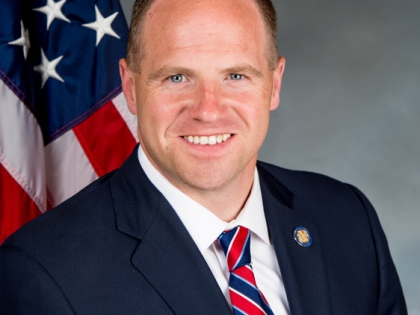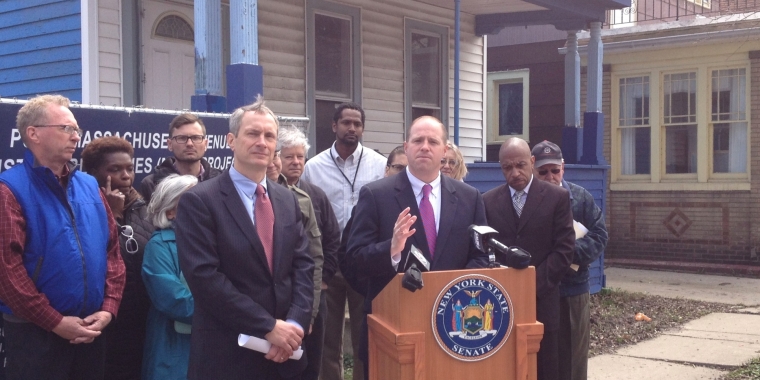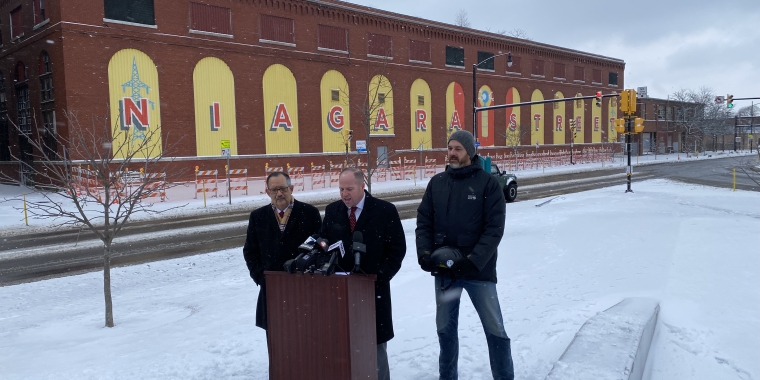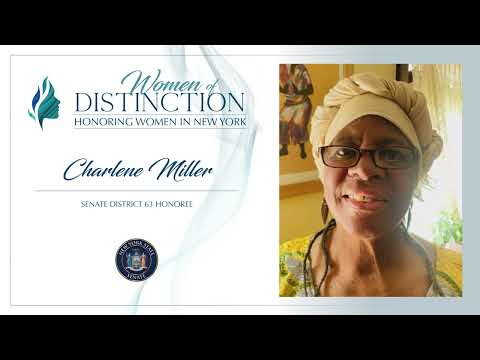
Kennedy, Ryan Unveil New Legislation to Protect Homeowners and Fight Blight in WNY Neighborhoods
Timothy M. Kennedy
May 1, 2014

New bills proposed by Kennedy and Ryan aim to hold slumlords accountable for their blighted properties and will add funding to the city’s weatherization and home-repair programs to help responsible homeowners.
Legislative effort at state-level inspired by Buffalo’s Project Slumlord.
BUFFALO, N.Y. – Senator Tim Kennedy and Assemblyman Sean Ryan today announced new legislation that that will help protect homeowners and combat blight in local neighborhoods. Standing in front of 97 Chenango Street, an ignored and vacant property that is blighting its West Side neighborhood, Kennedy and Ryan outlined the details of their legislation, which will help strengthen city neighborhoods by holding absentee landlords accountable while providing a new funding source for weatherization and home-repair programs for responsible homeowners.
Inspired by Buffalo’s Project Slumlord, this new legislation will empower municipalities with new tools to support community revitalization, protect and improve property values and attract new homeowners to resurgent neighborhoods. It will also allow communities to crackdown on absentee landlords whose negligence has been a cause of serious blight in several areas of Buffalo and Western New York.
“Across Western New York, dedicated homeowners are united behind the cause of addressing the problem of absentee landlords whose negligence and dilapidated properties are blighting our neighborhoods,” said Senator Tim Kennedy. “Throughout our region, a renewed sense of pride is taking hold of our communities as entire streets and neighborhoods are transformed. However, we still have slumlords to deal with, and their blighted properties are tarnishing our communities and bringing down the values of surrounding homes. Western New Yorkers take pride in their homes and neighborhoods, and it’s time for Albany to arm our towns and cities with new tools to crack down on absentee landlords and strengthen communities. By working together at the state and local level, we will ensure slumlords are no longer allowed to stand in the way of community revitalization.”
Assemblyman Sean Ryan said, “We have great neighborhoods throughout the City of Buffalo and Western New York, and we have many great leaders who love their communities and want to see vibrant and growing neighborhoods. But they know that absentee property owners are often holding back the progress that so many are seeking and working diligently towards. Efforts to revitalize the West Side are happening every day, and local elected leaders, community activists, and community organizations are constantly hitting stumbling blocks when they try to deal with neglectful and absentee property owners. Our common sense reform would allow municipalities to hold these individuals accountable and allow our neighborhoods to prosper and thrive.”
This new legislation is a direct result of a months-long partnership between Senator Kennedy, Assemblyman Ryan, city officials, housing advocates, community associations and Project Slumlord – a grassroots effort spearheaded by Allentown resident Patty MacDonald – to address Buffalo’s slumlord problem.
Patty McDonald of Buffalo’s Project Slumlord, said, “I’m proud to stand with Senator Kennedy and Assemblyman Ryan to hold slumlords accountable for the blight that they bring to our neighborhood. Slumlords enjoy easy profits by collecting rent for substandard housing while the city spends tens of thousands of dollars responding to 311 and 911 calls to their blighted properties. The legislation proposed by Senator Kennedy, along with the city legislation proposed by Council Members Fontana and Scanlon, will take the profit out of being a slumlord. The cost of blight will come out of the slumlord’s pocket, and the funds collected will go towards revitalizing our housing stock for the homeowners and tenants who see a bright future for Buffalo neighborhoods.”
Buffalo Common Council President Darius Pridgen has helped lead local efforts to combat slumlord problems and passed a resolution through the council to formally launch Project Slumlord as a city initiative. Kennedy and Ryan extended their gratitude to Council President Pridgen and the entire Buffalo Common Council for fighting hard on this important issue, and they cited the efforts of Councilmembers Rich Fontana and Chris Scanlon who recently proposed a resolution to pursue unpaid fines as property taxes. Once this state legislation passes, the Common Council would have the opportunity and authority to move forward with a city ordinance.
Council President Darius Pridgen said, “Slumlords should be take note as the City of Buffalo and the State move forward to protect neighborhoods and penalize landlords who ignore their responsibilities. I am ecstatic that Senator Kennedy and Assemblyman Ryan would press for the State of New York to join the City of Buffalo in its fight against irresponsible landlords that ignore their responsibilities and destroy neighborhoods.”
Councilman Rich Fontana said, “Working with Councilmember Scanlon, Senator Kennedy, and Assemblyman Ryan, we aim to strengthen our City’s Inspections Department and their ability to protect our neighborhoods. For too long absentee property owners have used loopholes to skirt paying fines and penalties. Under this new law, the city will be able to apply unpaid fines directly to property tax bills and potentially foreclose on properties, forcing slumlords to face the consequences of their negligent actions.”
This new Project Slumlord-inspired legislation comes in two bills. The first bill (S.6906/A.9189) establishes new authorization for municipalities – specifically the City of Buffalo – to enact a local law or ordinance to treat unpaid fines for housing-code violations as delinquent property taxes. This legislation will allow towns and cities to include any building-code or property-maintenance violations as tax liens on non-owner-occupied homes. If these tax liens are not resolved and paid, the property will become eligible for tax foreclosure by the city. Only absentee landlords would be impacted by this bill; strong protections for owner-occupied homes are included in the bill.
Code enforcement officials often have an incredibly difficult time collecting fines for housing code violations from slumlords and absentee landlords, who hide their identities behind limited liability corporations (LLCs) and often live out of the state or country. By treating unpaid housing code violations as tax liens, these slumlords will either have to pay up or risk foreclosure.
Once properties are foreclosed upon, they are then sold by the city at in-rem foreclosure auction. Currently, the city can only keep the money that is owed to them, and the rests sits with the County Comptroller’s office for a period of five years. If – after those five years – the proceeds of the sale go unclaimed, then the money is turned over to the state.
Rather than let this money continue to be swept up by Albany, Kennedy and Ryan want to see the funds stay in the city to improve the housing stock and boost neighborhood development. Their second bill (S.6681/A.9245) allows the City of Buffalo to keep the unclaimed surplus funds and directs the money to programs that help responsible homeowners with weatherization, home repairs and community development. These unclaimed funds will be used to support programs administered by the Buffalo Urban Renewal Agency that aim to strengthen city neighborhoods.
“Essentially, this legislative effort seeks to reverse the trajectory of a negative cycle of blight and decline that has hit Buffalo hard, and convert it into a positive cycle of absentee-landlord accountability and neighborhood improvement and development,” Kennedy said.
These legislative reforms inspired by Project Slumlord will complement legislation Kennedy proposed last year to hold banks accountable for zombie houses, or properties abandoned by their owners after banks commence foreclosure proceedings. Zombie foreclosures have proven to be another cause of blight in area communities. This legislation (S.5292), which Kennedy and Ryan are pursuing in Albany, will require banks to maintain a property if it becomes vacant after they commence a foreclosure proceeding. And if they fail to do that, the bill will allow law enforcement to charge banks and their executives with criminal penalties. Under the legislation, the state will be able to pursue a class B misdemeanor charge of Criminal Negligence of Vacant Property in Foreclosure Proceedings, which is punishable by a $10,000 fine or up to three months in prison.
###
Share this Article or Press Release
Newsroom
Go to NewsroomSenator Kennedy 2023 Veteran Hall of Fame
November 10, 2023



Senator Kennedy 2022 Woman of Distinction
August 26, 2022
